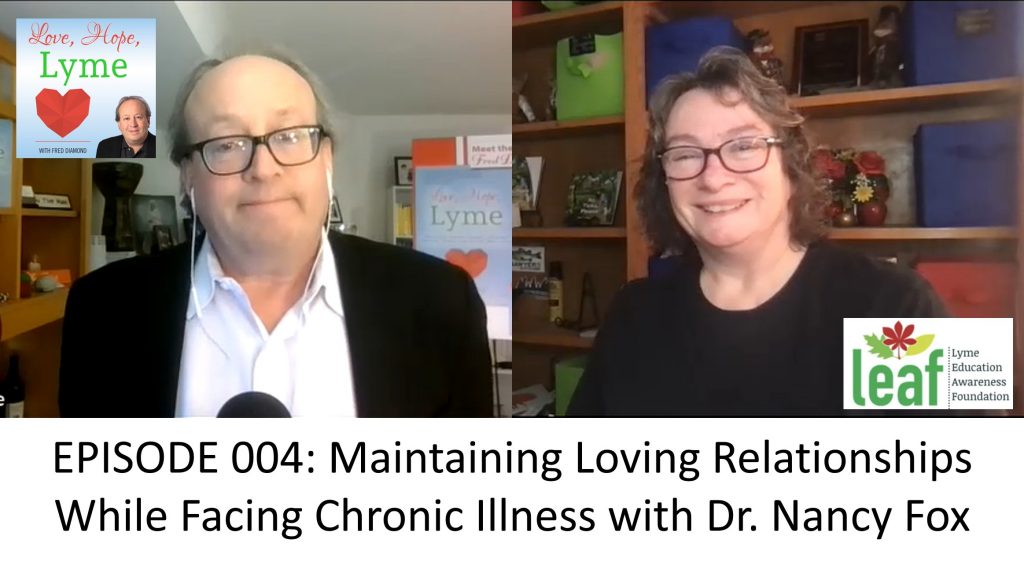Maintaining loving relationships while facing chronic illness

By Fred Diamond
When I wrote Love, Hope, Lyme: What Family Members, Partners and Friends Who Love a Chronic Lyme Survive Need to Know, I was surprised to learn that many relationships were at risk due to the challenges tick-borne illnesses caused.
I launched the Love, Hope, Lyme podcast to identify and eliminate some of the obstacles chronic illness puts in the way of healthy relationships, particularly those with family members, partners, and friends.
The latest episode features Dr. Nancy Fox, president of the Lyme Education Awareness Foundation (LEAF) and a chronic Lyme survivor herself. She discusses important things that family members, partners, and friends should know to better support their loved one with persistent Lyme disease.
She is the author of No Ticks, Please and Hide and Seek: No Ticks Please, two books geared toward children. LEAF educates families all over the United States about tick-bite prevention. Learn more here.
Click here to listen to the podcast.
Every survivor has unique concerns
“We all want to be treated in our own individualized way. For me, wanting somebody to simply make dinner, or to simply just be kind and supportive and give me a back rub may not be what another Lyme survivor needs. In some cases, they might not want to be touched because to be touched can be very sensitive, and that just gives them more pain,” she said.
She continued, “The best thing to do is to ask, and maybe the Lyme patient doesn’t know right then, but try to look at what they are doing and what they need. Maybe they need you to go get a drink of water for them, as simple as that, or put on their shoes, or just say I would like to help you. Just keep asking effective questions.”
Dr. Fox continued that you cannot expect them to be who they once were and that no one, especially before you’re diagnosed, tells you this.
She said, “The caregiver needs to know that you shouldn’t think that they can perform the duties or activities they did prior to getting Lyme and other tick-borne illnesses.”
She said caregivers need to know that how their loved ones will battle the disease will be different for everyone. She said to be aware that people with Lyme need to know when to fight and when to give in and let the body heal. She said it’s different for everyone and there is no set timeline for recovery.
“Most people get the flu and might be sick for a week,” she said. “Recovering from Lyme can go on for years and for many people it’s difficult to accept that mindset.”
Recovery can be wrought with frustration
Dr. Fox said that family members need to know that recovery is challenging.
“I was very blessed with my Lyme doctor, some alternative therapies, and a nutritionist, who helped in my recovery,” she said.
She continued that many Lyme survivors who have had success in treating symptoms often worry that the symptoms will come back. Many are tenacious with treating themselves, yet when their body isn’t cooperating, setbacks can occur.
When asked what people should expect that their loved one’s recovery journey should look like, she said they should “expect to not expect anything.”
“The expectation that this person is going to come back from this illness and be the person they were prior to the illness is probably not going to happen. I’m not the person that I was before Lyme disease. I’m very thankful that I have the ability to come back but there are going to be the ebbs and flows, and there’s going to be cycles with the symptoms,” she said.
In closing, Dr. Fox said to be aware that you can get bitten again so make sure that you and your loved ones take action to prevent this from happening.
Click here to listen to all episodes of the Love, Hope, Lyme Podcast.
Fred Diamond is based in Fairfax, VA and can be contacted via Facebook. His book, “Love, Hope, Lyme: What Family Members, Partners, and Friends Who Love a Chronic Lyme Survivor Need to Know” is available on Amazon. The e-version of the book is always free to Lyme survivors. Reach out to Fred on Facebook for your copy.





















We invite you to comment on our Facebook page.
Visit LymeDisease.org Facebook Page